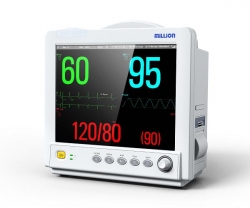Wechat QR code

TEL:400-654-1200

TEL:400-654-1200
Application of dynamic electrocardiogram in the diagnosis of arrhythmia
At present, the diagnosis of arrhythmia and myocardial ischemia is still the most widely used dynamic electrocardiogram.
I. Dynamic electrocardiographic manifestations of ordinary people
Because the examiner has different physiological activities in 24 hours, such as exercise, activity, diet, sleep and so on, the patient's posture and autonomic nervous tension are also different, and the results of dynamic electrocardiogram examination in 24 hours will have greater variation. Monitor manufacturers
The average 24-hour sinus heart rate in adults ranges from 60 BPM to 80 bpm, and decreases with age, but the decrease of the highest heart rate during the day is more obvious. The highest heart rate in the elderly is generally not more than 130 bpm. Females are 5_10 BPM taller than males. Sinus tachycardia is very common on dynamic electrocardiogram. Sinus heart rate can be higher than 180 BPM during exercise in young people. However, at night, the lowest sinus heart rate during sleep can be located between 35 and 60 bpm, especially at 4-5 am. If the lowest night heart rate is below 35 bpm, the increase of vagal nerve tension or the decrease of sinoatrial node function should be considered. The normal range of sinus heart rate set by conventional electrocardiogram is 60-100 bpm, which is obviously not suitable for dynamic electrocardiogram. However, the normal value of dynamic electrocardiogram of sinus heart rate is still lacking. Electroencephalograph
Electroencephalograph

(2) Arrhythmia
1. Sinus rhythm
In normal people, sinus arrhythmia and sinus arrest can occur, which are related to changes in respiratory and autonomic nerve tension. Sinus arrest usually lasts for 1.2_2.0s. In very few cases (such as athletes), arrest of more than 2.5s can occur. If it occurs in general adults or the elderly, it should be considered abnormal. 2. Supraventricular arrhythmia
Supraventricular arrhythmias can be detected in 50%-70% of normal people and increase with age. Isolated asymptomatic supraventricular ectopic beats were found in 64% of healthy young people, with fewer episodes. With the increase of age, the number and incidence of premature beats increased gradually, 90% of the elderly had atrial premature beats, and 98% of the patients with supraventricular premature beats had less than 100 premature beats. Premature beats are less common in newborns and children. Short paroxysmal atrial tachycardia occurs in 2%-5% of young people, and is more common in the elderly. Electroencephalograph
3. Ventricular arrhythmia
In large-scale population studies, the incidence of ventricular premature beats monitored by dynamic electrocardiogram was 60%. The total number of premature ventricular beats is usually small. 96% of the people have less than 100 premature ventricular beats in 24 hours. However, the incidence of premature ventricular beats is significantly increased in people aged 60 or over, and the number of premature ventricular beats in 24 hours is also increased. 100% of healthy elderly men and women over 80 years old have premature beats. 4. Atrioventricular blockMonitor manufacturers
2-8% of normal people have temporary first-degree or second-degree atrioventricular block (mostly Venturi type conduction block), often occurring at night when sleep heart rate is slow, which may be related to increased vagal nerve tension. It is mainly found in young people and in sleep. Professional athletes may suffer from various slow arrhythmias.